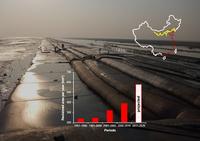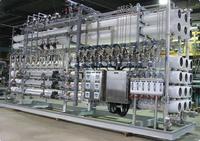-
A malware more sophisticated than Stuxnet discovered
Security experts at Symantechave discovered the world’s most sophisticated computer malware, Regin. Thought to have been created by a Western intelligence agency, and in many respects more advanced than Stuxnet — which was developed by the U.S. and Israeli government in 2010 to hack the Iranian nuclear program — Regin has targeted Russian, Saudi Arabian, Mexican, Irish, and Iranian Internet service providers and telecoms companies. “Nothing else comes close to this … nothing else we look at compares,” said one security expert.
-
-
Security concerns over purchase of Waldorf Astoria by Chinese company

Citing espionage risk, U.S. officials are expressing concern over the sale of the historic Waldorf Astoria hotel in New York City to a Chinese insurance company. The sale of the hotel will likely lead to a review by the U.S. Committee on Foreign Investment (CFIUS) of the Chinese firm’s long-term plans for the site and the finer details of the sale. “Because the agreement calls for major renovations to the hotel, CFIUS will be worried that the Chinese could engage in some form of espionage,” said a former Treasury Department official who managed CFIUS reviews.
-
-
China’s second “great wall” is not so great

China’s coastal regions are only 13 percent of the country’s land area, but contribute 60 percent of its gross domestic product. With that come layers of incentives to turn lush wetlands into engines of development and industry. A new study finds that China’s second great wall, a vast seawall covering more than half of the country’s mainland coastline, is a foundation for financial gain - and also a dyke holding a swelling rush of ecological woes.
-
-
New, updated resource on STEM education, workforce
It just became a lot easier for educators, students, parents, policymakers and business leaders to learn more about national trends in education and jobs in science, technology, engineering, and mathematics (STEM). The National Science Board (NSB) last month released an interactive, online resource featuring new and updated data and graphics about STEM education and workforce in the United States and providing facts on topics such as student proficiency, college degrees in STEM fields, and jobs in science-related occupations.
-
-
Selling and buying water rights
Trying to sell or buy water rights can be a complicated exercise. First, it takes time and effort for buyers and sellers to find each other, a process that often relies on word-of-mouth, local bulletin boards, even calling friends and neighbors to get the word out. Then they must deal with the maze of rules and regulations involved. Finally, they must reach a fair price. It would be much easier if a computer could do it. Now, one can. Scientists have developed an algorithm that can match potential buyers and sellers, sift through the complexity of local physical and regulatory systems, and reach a fair deal designed especially for them.
-
-
Climate-related businesses growing
The business of climate change has seen significant growth in the last decade, but analysts believe it will take many more years to determine the effectiveness of the solutions proposed by climate-focused businesses. U.S. farmers working more than fifty million acres had subscribed to its Climate Basic Service— a free Web and mobile service that analyzes data to help farmers make planting decisions with “field-level insights, from soil moisture levels, to crop growth stage, to current and future weather.” The group’s free app and Web service may be augmented through its Climate Proand Precision Acrepaid plans.
-
-
Water sector ready for investment, technological innovation

Investors looking for promising growth markets would do well to consider their water bill. Water’s artificially low price in most of the United States is one factor holding back innovative new water technologies, according to the report – but the time is right for change. Across the West, drought has left wide swaths of agricultural land brown, with massive wildfires raging through tinder-dry forests, residential wells tapped out and unemployed farm workers crowding food pantries. The drought is projected to cost the agricultural sector about $2.2 billion in 2014. The social and ecological damage is also profound. Technological innovation in the water sector could bring a raft of benefits ranging from the conservation of scarce water supplies to the expansion of water supplies through technologies that recycle or desalinate, for example.
-
-
More companies adopt active defense to thwart hackers
Some U.S. companies are beginningto counter-hack cybercriminals by using intelligence shared within industry circles. Federal officials have not openly endorsed active defense, but measures like tricking hackers into stealing fake sensitive data, then tracking its movements through the Web, are gaining support. Some firms have gone as far as hacking alleged criminals’ servers. “The government is giving ground silently and bit by bit on this [active defense] by being more open,” said former National Security Agencygeneral counsel Stewart Baker. “I have a strong sense from everything I’ve heard. . . that they’re much more willing to help companies that want to do this.”
-
-
Vets, victims’ family members suing European banks for supporting terrorism
About 200 U.S. veterans and family members of soldiers killed in Iraq filed a lawsuit on Monday in the U.S. District Court in Brooklyn, New York, claiming five European banks were partly responsible for a series of shootings and roadside bombings in Iraq. The lawsuit brought under the 1992 U.S. Anti-Terrorism Act, which permits victims to bring private suits against alleged financiers of militant and terrorist operations.
-
-
Information sharing is key in responding to cyberattacks
Time is not your friend when your information systems are under cyberattack, but sharing threat information before, during, and after an attack with a trusted group of peers can help. Not only does it alert the other members of your community to a potential attack, it can provide critical actionable information to speed and bolster your own defenses. Participating in a formal information sharing group can greatly enhance an organization’s cybersecurity capabilities.
-
-
Protecting the U.S. food supply from agroterrorism

“For the life of me, I cannot understand why the terrorists have not attacked our food supply because it is so easy to do,” said Tommy Thompson during his 2004 farewell speech when he left his post as U.S. secretary of Health and Human Services. Documents found in a 2002 U.S. military raid on an al-Qaeda warehouse showed that terrorists sought to contaminate the U.S. food supplies. The documents included detailed instructions for attacking U.S. agricultural assets. Researchers at the University of California-Davis’ Western Institute for Food Safety and Security(WIFSS) are studying vulnerabilities of the U.S. agricultural system to the threats of agroterrorism.
-
-
Mission Secure closes round of seed financing to commercialize cybersecurity technology
Charlottesville, Virginia-based Mission Secure Inc. (MSi), a cyberdefense technology and solutions provider focusing on protecting physical systems and autonomous vehicles, last week announced it had recently closed its seed financing round led by Ballast Fund investors, a private equity firm and several high net worth angel investors.
-
-
FBI: Lawmakers should mandate surveillance “backdoors” in apps, operating systems
FBI director James Comey said that the agency was pushing lawmakers to mandate surveillance functions in apps, operating systems, and networks, arguing that privacy and encryption prevent or disrupt some of the agency’s investigations. According to Comey, new privacy features implemented by Google and Apple in the wake of the Snowden revelations, automatically encrypt user communication and data, making it difficult for law enforcement to gather evidence and connect links among suspected criminals and terrorists.
-
-
Russian government hackers insert malware in U.S. critical infrastructure control software
Investigators have uncovered a Trojan Horse named BlackEnergy in the software that runs much of the U.S. critical infrastructure. In a worst case scenario, the malware could shut down oil and gas pipelines, power transmission grids, water distribution and filtration systems, and wind turbines, causing an economic catastrophe. Some industry insiders learned of the intrusion last week via a DHS alert bulletin issued by the agency’s Industrial Control Systems Cyber Emergency Response Team(ICS-CERT). The BlackEnergy penetration had recently been detected by several companies. Experts say Russia has placed the malware in key U.S. systems as a threat or a deterrent to a U.S. cyberattack on Russian systems – mutual assured destruction from a cold war-era playbook.
-
-
Quick Halal test device determines whether food contains pork
There are more than a billion Muslims on Earth, and many of them observe the Halal strictures, making the Halal segment of the food market a multi-billion dollar segment – worth $6.8 billion in France alone. A French start-up is now offering Muslims – and observant Jews, for that matter – a portable device which would allow them to find out whether a dish they have ordered or the food product they have bought contains pork.
-
More headlines
The long view
Ransomware Attacks: Death Threats, Endangered Patients and Millions of Dollars in Damages
A ransomware attack on Change Healthcare, a company that processes 15 billion health care transactions annually and deals with 1 in 3 patient records in the United States, is continuing to cause massive disruptions nearly three weeks later. The incident, which started on February 21, has been called the “most significant cyberattack on the U.S. health care system” by the American Hospital Association. It is just the latest example of an increasing trend.
Chinese Government Hackers Targeted Critics of China, U.S. Businesses and Politicians
An indictment was unsealed Monday charging seven nationals of the People’s Republic of China (PRC) with conspiracy to commit computer intrusions and conspiracy to commit wire fraud for their involvement in a PRC-based hacking group that spent approximately 14 years targeting U.S. and foreign critics, businesses, and political officials in furtherance of the PRC’s economic espionage and foreign intelligence objectives.
European Arms Imports Nearly Double, U.S. and French Exports Rise, and Russian Exports Fall Sharply
States in Europe almost doubled their imports of major arms (+94 per cent) between 2014–18 and 2019–23. The United States increased its arms exports by 17 per cent between 2014–18 and 2019–23, while Russia’s arms exports halved. Russia was for the first time the third largest arms exporter, falling just behind France.
LNG Exports Have Had No Impact on Domestic Energy Costs: Analysis
U.S. liquified natural gas (LNG) exports have not had any sustained and significant direct impact on U.S. natural gas prices and have, in fact, spurred production and productivity gains, which contribute to downward pressure on domestic prices.
